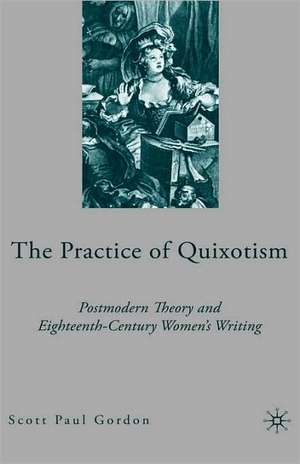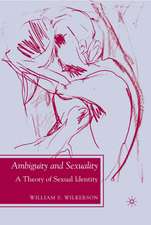The Practice of Quixotism: Postmodern Theory and Eighteenth-Century Women's Writing
Autor S. Gordonen Limba Engleză Hardback – 18 dec 2006
| Toate formatele și edițiile | Preț | Express |
|---|---|---|
| Paperback (1) | 384.09 lei 6-8 săpt. | |
| Palgrave Macmillan US – 18 dec 2006 | 384.09 lei 6-8 săpt. | |
| Hardback (1) | 386.99 lei 6-8 săpt. | |
| Palgrave Macmillan US – 18 dec 2006 | 386.99 lei 6-8 săpt. |
Preț: 386.99 lei
Nou
Puncte Express: 580
Preț estimativ în valută:
74.05€ • 77.51$ • 61.63£
74.05€ • 77.51$ • 61.63£
Carte tipărită la comandă
Livrare economică 31 martie-14 aprilie
Preluare comenzi: 021 569.72.76
Specificații
ISBN-13: 9781403974440
ISBN-10: 1403974446
Pagini: 240
Ilustrații: VIII, 241 p.
Dimensiuni: 140 x 216 x 19 mm
Greutate: 0.39 kg
Ediția:2006
Editura: Palgrave Macmillan US
Colecția Palgrave Macmillan
Locul publicării:New York, United States
ISBN-10: 1403974446
Pagini: 240
Ilustrații: VIII, 241 p.
Dimensiuni: 140 x 216 x 19 mm
Greutate: 0.39 kg
Ediția:2006
Editura: Palgrave Macmillan US
Colecția Palgrave Macmillan
Locul publicării:New York, United States
Cuprins
Introduction: The Quixote Trope Historicizing Quixote and the Scandal of Quixotism Charlotte Lennox's Female Quixote and Orthodox Quixotism Suspicion and Experience in Sarah Fielding's David Simple Mary Wortley Montagu and the Quixotic Dream of Objectivity Quixotic Perception in Sophia Lee's The Recess Ann Radcliffe's The Mysteries of Udolpho and the Practice of Quixotism Epilogue: Beyond Quixotism?: Quixotism and Contemporary Theory
Recenzii
"Cervantes errant knight emerges as a metaphor for aberrant imagination in Scott Paul Gordon s discussion of the clash between Romantic and Enlightenment thought. Ranging across materials by early women writers - satire, poetry, and prose fiction - Gordon finds that the Quixotic becomes synonymous with misreading. This book then parries with established critical readings to offer provocative reinterpretations of its own." - Janine Barchas, University of Texas at Austin
"The Practice of Quixotism is a profoundly learned, astonishingly clever, and repeatedly eye- opening book.Differentiating between orthodox quixote narratives (which ask us to believe in the possibility of waking up to the real) and those texts that foster greater skepticism toward how reality is constructed, Gordon illustrates the unexpected ways that the quixote trope was employed during the long eighteenth century in Great Britain. Through careful readings of works by Charlotte Lennox, Sarah Fielding, Lady Mary Wortley Montagu, Sophia Lee, and Ann Radcliffe, among others, Gordon offers fascinating epistemological and narrative connections.The book makes an important contribution to several fields of inquiry, simultaneously illuminating the literature of quixotes past and present theoretical controversies.Gordon convincingly demonstrates that all of us are quixotic, whether we acknowledge it or not, and shows that at least some eighteenth-century authors were wise to the problem.No previous scholar has given us such depth of perspective on the subject." - Devoney Looser, University of Missouri-Columbia"The Practice of Quixotism reflects Gordon's skill as a widely rea hermeneut, and it is a remarkable work of intellectual history and literary criticsm. By viewing the transition from Enlightenment to Romantic thought through the lenses of the quixote trope and postmodern theory, Gordon forces a reconsideration of the feminist critical consensus on works by Lennox, Lee, Sarah Fielding, and others. Through complex and subtle readings of women's writing, Gordon offers a new way to understand British culture in the long eighteenth century." - Stephen A. Raynie, Gordon College
"The Practice of Quixotism is a profoundly learned, astonishingly clever, and repeatedly eye- opening book.Differentiating between orthodox quixote narratives (which ask us to believe in the possibility of waking up to the real) and those texts that foster greater skepticism toward how reality is constructed, Gordon illustrates the unexpected ways that the quixote trope was employed during the long eighteenth century in Great Britain. Through careful readings of works by Charlotte Lennox, Sarah Fielding, Lady Mary Wortley Montagu, Sophia Lee, and Ann Radcliffe, among others, Gordon offers fascinating epistemological and narrative connections.The book makes an important contribution to several fields of inquiry, simultaneously illuminating the literature of quixotes past and present theoretical controversies.Gordon convincingly demonstrates that all of us are quixotic, whether we acknowledge it or not, and shows that at least some eighteenth-century authors were wise to the problem.No previous scholar has given us such depth of perspective on the subject." - Devoney Looser, University of Missouri-Columbia"The Practice of Quixotism reflects Gordon's skill as a widely rea hermeneut, and it is a remarkable work of intellectual history and literary criticsm. By viewing the transition from Enlightenment to Romantic thought through the lenses of the quixote trope and postmodern theory, Gordon forces a reconsideration of the feminist critical consensus on works by Lennox, Lee, Sarah Fielding, and others. Through complex and subtle readings of women's writing, Gordon offers a new way to understand British culture in the long eighteenth century." - Stephen A. Raynie, Gordon College
Notă biografică
SCOTT PAUL GORDON is an Associate Professor of English, and Co-Director of the Lawrence Henry Gipson Institute for Eighteenth-Century Studies, at Lehigh University. He has published The Power of the Passive Self in English Literature, 1640-1770 (2002), as well as numerous articles on seventeenth- and eighteenth-century British culture.














